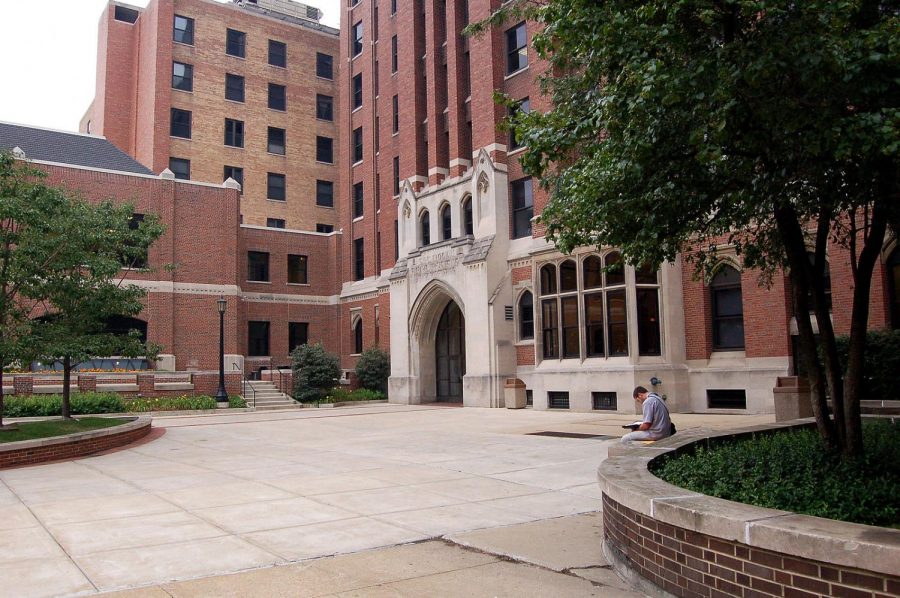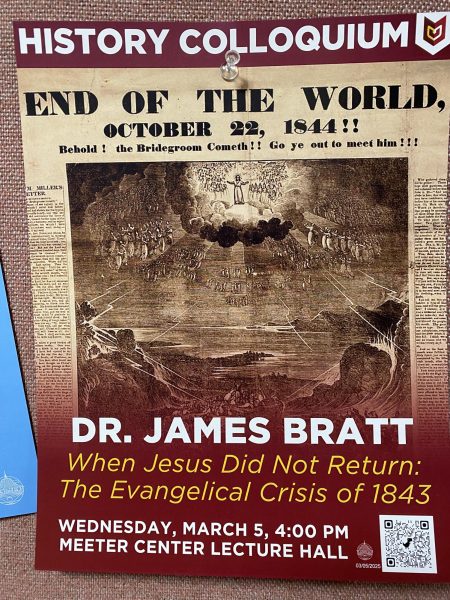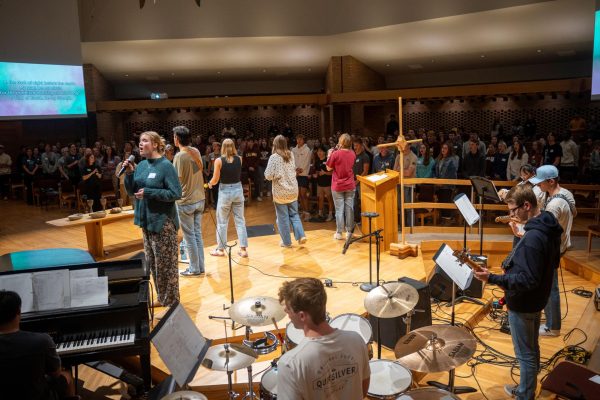Moody Bible Institute faces investigation for financial, theological offenses
Moody Bible Institute (MBI) is currently facing scrutiny in regards to issues of theological orthodoxy and financial stewardship.
Moody, named after 19th century businessman and theologian Dwight Lyman Moody, is much like a seminary for undergraduates in that it maintains a distinctive of training students for full-time vocational ministry. Located in downtown Chicago’s Near North Side, with a satellite campus in Spokane, Washington, Moody exists to give students “a combination of biblical knowledge and ministry experience,” according to its website.
In January of this year, Julie Roys, a talk show host on the college’s radio network provoked deep concern by blowing the whistle on Moody’s faculty and executive staff, claiming that a number of questionable financial decisions and significant theological drifting were occurring at the flagship evangelical institution.
One such claim has to do with the stewardship of school funds. Due to a recent decline in attendance, 28% over the last five years, leadership at MBI informed 30 of their 124 full-time faculty members that their contracts would not be renewed. Moody does not provide professors with tenure.
This sparked significant controversy in the backdrop of a 24-million-dollar building project for the Chapman Global Media Center, as well as a $500,000 loan given to then-president Paul Nyquist for a Chicago condo worth over $1 million. Moody has denied the relevance of the still underfunded Chapman Center to the school’s financial woes, claiming that the money for the center was donated and hasn’t been pulled from Moody’s general fund.
In addition to the financial controversy, some theological issues have been raised as well. Roys claims that Moody has not enforced its historical stance of requiring faculty to adhere to explicitly conservative evangelical theology. Several professors have recently been accused of abandoning the doctrine of Biblical inerrancy. This claim, however is denied vehemently by Bryan O’Neal, who is a theology professor at the school as well as vice president.
“All of our faculty affirm inerrancy annually when they sign their annual contract. It’s explicit. … There is no drift. It is always possible that an individual within an institution does drift or lean, and then that has to be examined and corrected.”
In addition to this, several students have also claimed that there are professors who promote progressive sociopolitical ideas in the classroom, including one professor who supports Planned Parenthood and another who teaches pupils about white privilege.
Just hours after Roys made these claims on her talk show and subsequently her blog, the school sent her an email terminating her employment and informed her that a man was on his way to seize her laptop and other Moody-owned property. Roys was on her way to a vacation in Mexico with the computer when she received the email.
Marvin Olasky, in his article about the controversy, said, “Firing a person who complained about an atmosphere of fear, intimidation and retaliation at Moody made many believe she had a point.” Others, however, were happy to see the integrity of the leadership at MBI defended with such potency, particularly alumni and concerned parents.
Roys claimed that there are other specific details she hasn’t gone into, but has warned the school that if they don’t start correcting some of the issues, she would go public with more information. She summarized her statement to the school by saying, “There’s a hole in the ship. … I’d prefer you patch it, but if you’re not going to do it, I’ll warn the people to get their luggage off.”
The next day, the Moody Board of Trustees decided that it was time for a “new season of leadership,” and consequently President Paul Nyquist, COO Steve Mogck, and Provost Junias Venugopal resigned. Even with these changes in the executive branch, some claim that even more financial redistribution should be implemented, as there are 15 full-time positions of managerial leadership at the school, which is by far the most in any Christian college in the United States.
Moody Bible Institute is not the only Christian institution in the United States facing major financial and theological crises. In recent years, many colleges around the country have seen at least one of these issues arise, and Calvin is no exception. Budget cuts because of decreased enrollment have prompted the school to lay off many faculty members, and some departments have been dissolved completely. Similarly to the Moody scenario, many people agree with these decisions, while some argue that letting faculty go was not the best route to take. Others claim that budget cuts were appropriate but misplaced.
As for theological issues, Calvin is no stranger. In 2011, two professors in the Religion department received criticism for their scholarly articles which suggested that, given contemporary research on genetics and evolution, a traditional literal reading of the creation account in Genesis may not lead to the most appropriate interpretation. After this, one professor resigned as part of an agreement with the college, while the other still remains on the faculty.
There are, however, some measures in place to avoid major theological drift at Calvin. College chaplain Mary Hulst, said:
“As the college of the CRCNA, we have very clear theological moorings. Denominational structure, church memberships of our Board members, and our alliance with the CRCNA all help in situations in which difficult decisions need to be made.”
As a denominational school, there are more theological hoops to jump through in potentially difficult situations, as opposed to Moody which has Baptist roots but is not affiliated with any specific denomination.
Many students at Moody are eager to work out these problems and are looking forward to a bright future, including Joshua McKee, a current student at Moody.
“[Students are] aware of the need for difficult conversations to take place, and are also willing to engage in those conversations. They are acutely aware of the need for genuine and open communication towards promoting a community which is unified through Christ and eager to serve the kingdom.”








Fred Scanlan • Mar 21, 2019 at 7:30 pm
As a layman and without a formal ed. this is what I know. In the beginning was the Word. The word was made flesh (and) dwelt among us. The wind bloweth were it listeth (and) I hearest the sound thereof (and) cannot tell wither it cometh or goeth (and) So is everyone that is born of the spirit of God, (and) Without controversy great is the mystery of godliness, (and). If you student, can explain these things to me, THEN I will begin to listen to something you might have to say. In the mean time you should study to show thyself approved. Be vigilant and be sober.Let your nay be nay and your yea be yea! Yours truly, I wish I had your opportunity!
Kreig Alm • May 17, 2018 at 1:15 am
Basically, don’t quench the Spirit. He will reveal himself to children while the know it alls are free to refuse to let go of a high and mighty attitude…
Danny Iselin • Feb 15, 2018 at 7:58 pm
All theological schools would do well to remember the incident in which our Lord cursed the fig tree for not producing the early buds it was supposed to around Passover time. Our Savior didn’t appoint the twelve to be academic Scriptural scholars but rather heralds of the Evangelion. When the training becomes professionally institutional, the Holy Spirit is upstaged in His work. All theological professors, employees, students, pastors and especially donor$ must realize this.
Josh • Feb 16, 2018 at 5:34 pm
Jesus himself spent years training in the temple under the Rabbi, and Daniel was educated an extremely high, formal level as well. Institutions have no authority to upstage the Holy Spirit- God will not be upstaged. Individuals can quench the spirit in their own lives however, and one sure fire way to this is divisive and polemic discourse with fellow Christians.
joe • Apr 28, 2018 at 5:42 am
No one said anything against training. He said when it becomes professionally institutional. When the goal of the institution becomes academic/professional only, the Holy Spirit can be quenched.
Kreig Alm • May 17, 2018 at 1:11 am
Amen to that. The Holy Spirit has been slowly pushed out of believers lives for a long time now. Christian colleges struggle the most because while they can pluck plumb lines with scripture they struggle to direct the wind.
Still, that Wind is part of the trinity and the Author of the Bible which (yes I will shockingly say) is not part of the trinity!
That being said, perhaps if the Holy Spirit we’re pursued more the Bible itself would be elevated far beyond its current ‘theological moorings’ and it’s understanding would not be limited to only glorified pastoral graduates.
Heavens.
Kreig Alm • May 17, 2018 at 1:09 am
Amen to that. The Holy Spirit has been slowly pushed out of believers lives for a long time now. Christian colleges struggle the most because while they can pluck plumb lines with scripture they struggle to direct the wind.
Still, that Wind is part of the trinity and the Author of the Bible which (yes I will shockingly say) is not part of the trinity!
That being said, perhaps if the Holy Spirit we’re pursued more the Bible itself would be elevated far beyond its current ‘theological moorings’ and it’s understanding would not be limited to only glorified pastoral graduates.
Heavens.